
A year after Oswaldo Paya Sardinas died under dubious circumstances, his legacy lives on among thousands of Cubans who signed the Varela Project – an initiative launched by Paya in 1998, whose purpose was to enforce changes in the Constitution which would allow legitimate exercise of freedom of expression, press and association, as well as of the right to private property, free elections and amnesty for political prisoners. Paya’s Christian-democratic endeavor has become one of the strongest platforms in the fight against totalitarianism.
The Varela Project consists of a series of tactics and strategies developed by hundreds of collaborators from all over the island. It reflects the character of its founder, Paya, who was a man committed to his country, highly capable of responding to political challenges in the well-established repressive environment he was living in. Thanks to the moderation and consistency of his beliefs he became a respected and influential leader with great prospects.
The arrests and subsequent imprisonment of 75 opposition leaders and activists, including several of the most active members of the Christian Liberation Movement, forced the opposition into retreat, from which it was able to come out only gradually. Despite all setbacks and constant threats and persecution, Oswaldo Paya continued developing new projects with the support of other groups of followers.
Paya had been committed to the fight against communism since his very young age. Having been brought up in a Catholic family, he was in the center of attention of the dictatorial government, especially in the years marked by political extremism. That period had a severe impact on all people and institutions that failed to follow the new order established by the Communist Party. Also, Paya had to spend three years in a labor camp while serving the compulsory military service for having refused to transport a group of political prisoners.
His is a life of moral and ethical integrity, which he had shown for over two decades as a leader of a political project, which greatly disturbed the governing elite. With the Varela Project, Paya forced the regime to go on a counter-offensive on a national level: it held an election in which millions of citizens were made to approve a legislative decree declaring the irreversibility of socialism.
A dark cloud hangs over the death of Paya, who died in a car accident on a secluded road in the east of Cuba. Paya’s family insists that it was a premeditated murder, but many analysts deny such statements, pointing out that there were two foreigners travelling in the car who survived the accident with only minor injuries: Angel Carromero, a Spanish citizen, who was at the wheel of the rented car, and Aaron Modig, his Swedish co-driver.
Critics of the assassination theory argue, among other things, that the Cuban government wouldn’t risk such serious diplomatic and political consequences that it would have to face if all passengers travelling in the car were killed. In this case, the regime would have to allow international investigation into the circumstances of the accident, which is something it will hardly permit if it is demanded only by Paya’s widow, Ofelia Acevedo, and his daughter Rosa Maria.
We can barely expect that the facts of what had actually happened will be clarified in foreseeable future. After receiving punishment in Cuba and being sent back to his home country, Carromero confirmed that it wasn’t an accident but a crime. Yet, his testimony doesn’t suffice to learn the truth, which has been lost in a maze of silence and ambiguities.
Some also argue that there was no need for the regime to kill Paya or his collaborator, Harold Cepero, who also died in the accident. Although there may be some substance in such logic, even the most rational reasoning cannot explain the evil intentions of a government known for its zoological hatred for its opponents. Perhaps the plan went wrong, perhaps it wasn’t conceived to have such tragic consequences and the fatal accident happened due to an operational failure. Any scenario must be considered in a situation where lack of transparency seems to have no end.
The truth is that with the physical death of Oswaldo Paya, a cycle has been closed. Like it or not, Paya’s death has sullied all efforts to achieve democracy, which are still far from bearing fruit. The Christian Liberation Movement will never be the same. The question is, will it pass the test of the events?

Leave a comment